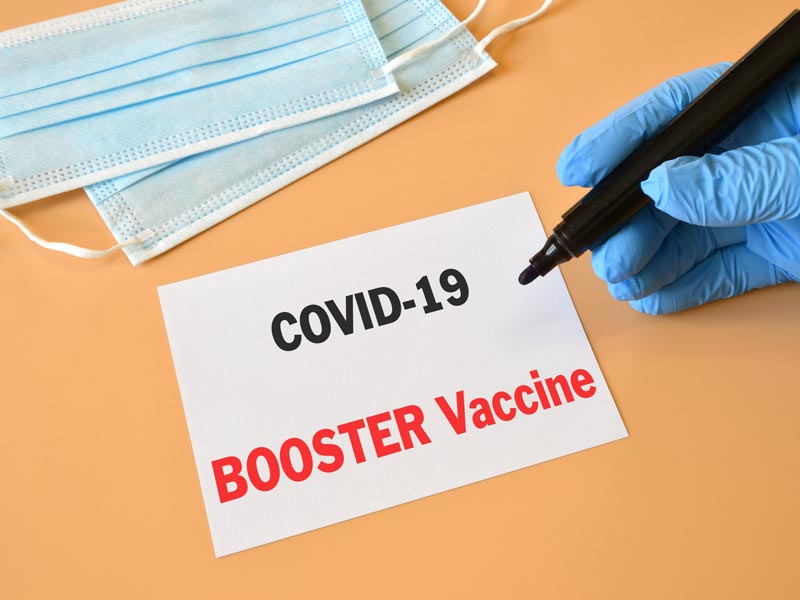AAFP Signs Off on Use of Second COVID-19 Vaccine Booster
April 1, 2022, 8:41 a.m. News Staff — The AAFP has approved decisions made by the CDC and FDA on March 29 for use of a second booster dose of an mRNA COVID-19 vaccine in certain patient populations.

The CDC updated the agency’s recommendations to allow for the administration of a second booster dose in individuals age 50 years and older and in people with certain types of immunocompromising conditions. Earlier the same day, the FDA took regulatory action to amend the emergency use authorizations for the Pfizer-BioNTech and Moderna COVID-19 vaccines.
The AAFP approved the actions following an expedited review of the evidence, and has updated its COVID-19 Booster Doses FAQs webpage to reflect the latest information.
“Boosters are safe, and people over the age of 50 can now get an additional booster four months after their prior dose to increase their protection further,” said CDC Director Rochelle Walensky, M.D., adding, “CDC, in collaboration with FDA and our public health partners, will continue to evaluate the need for additional booster doses for all Americans.”
Story Highlights
The FDA’s actions amend the Pfizer-BioNTech and Moderna EUAs to allow for
- a second booster dose of either the Pfizer-BioNTech or Moderna vaccine for individuals age 50 years and older at least four months after receipt of a first booster dose of any authorized or approved COVID-19 vaccine,
- a second booster dose of the Pfizer-BioNTech vaccine for individuals age 12 years and older with certain kinds of immunocompromising conditions (such as solid organ transplant or an equivalent level of compromised immunity) at least four months after receipt of a first booster dose of any authorized or approved COVID-19 vaccine, and
- a second booster dose of the Moderna vaccine at least four months after the first booster dose of any authorized or approved COVID-19 vaccine to individuals age 18 years and older with the same certain kinds of immunocompromising conditions.
“Current evidence suggests some waning of protection over time against serious outcomes from COVID-19 in older and immunocompromised individuals,” said Peter Marks, M.D., Ph.D., director of the FDA’s Center for Biologics Evaluation and Research, in a statement explaining the FDA’s action. “Based on an analysis of emerging data, a second booster dose of either the Pfizer-BioNTech or Moderna COVID-19 vaccine could help increase protection levels for these higher-risk individuals.
“Additionally, the data show that an initial booster dose is critical in helping to protect all adults from the potentially severe outcomes of COVID-19. So, those who have not received their initial booster dose are strongly encouraged to do so.”
Separate from the FDA action, the CDC also used newly published data to support an additional change to its interim recommendations to allow adults who received a primary vaccine and booster dose of the Janssen/Johnson & Johnson COVID-19 vaccine at least four months ago to receive a second booster dose using an mRNA COVID-19 vaccine.
COVID-19 Variants Remain a Concern
The CDC’s updated recommendations and the FDA’s action came as evidence suggests that the omicron BA.2 subvariant has become the dominant strain of the SARS-CoV-2 virus in the United States. Recently released data from the CDC indicate that for the week ending March 26, the BA.2 subvariant was responsible for roughly 55% of all COVID-19 cases in the United States.
In a separate statement, Marks said people may need another booster shot in the fall if evidence suggests that it would be beneficial. He added that the United States could also switch to a different vaccine that targets a specific variant of COVID or a mix of several variants.
The FDA’s Vaccines and Related Biological Products Advisory Committee will meet April 6 to discuss potential future booster shots and begin determining whether the existing vaccines need to be updated to provide better protection against COVID variants.
Family Physician Perspective
Corey Lyon, D.O., an associate professor in the Department of Family Medicine at the University of Colorado School of Medicine, Denver, associate program director at the University of Colorado Family Medicine Residency program, and a member of the Academy’s Commission on Health of the Public and Science, told AAFP News that it is important for people to remain vigilant and get a second booster dose if they are eligible.
“We know that our time with COVID and COVID infections is not over, and we do expect additional surges in one way or another in the future, especially as new variants are being identified,” said Lyon. “We also know that our older population and those considered to be immunocompromised are at the greatest risk of complications from infections. The COVID vaccine is the most effective way to prevent these complications and keep our patients as safe and healthy as possible.”
Lyon also highlighted the role that family physicians can play in talking with patients about the benefits of vaccination and ensuring that people get vaccinated.
“Family physicians are key to communicating the value and importance of the COVID vaccine and boosters to our patients,” Lyon said. “We see patients every day in our clinics across the U.S., and that is where we will start with identifying eligible patients, discussing the importance of these boosters and ensuring our patients have timely access to the vaccines.”
More From the Academy
All COVID-19 vaccine-related recommendations are subject to review and approval by the Commission on Health of the Public and Science and the AAFP Board Chair, who voted to support the FDA’s action and the CDC’s updated recommendations based on their review of the supporting evidence.
AAFP staff experts are frequently updating resources and content on AAFP.org and familydoctor.org to keep members aware of the latest information. The Academy’s COVID-19, COVID-19 Vaccine and COVID-19: Clinical Resources & Patient Education webpages contain the latest information family physicians need about the pandemic, and vaccines and therapeutics used to fight COVID-19, along with information on recent and upcoming regulatory meetings, educational materials for clinicians and patients, advocacy and more.